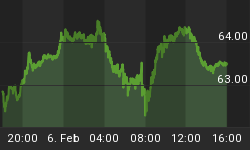We have already discussed the lack of consensus amongst the sentiment indicators, and this discrepancy in the data has me cautious. Typically, the best market bottoms leading to the most sustainable market rallies occur when the indicators are in alignment. But despite the lack of convergence, there is one thing the investors seem to agree upon: that some central bank entity (or maybe all of them) has their backs. Whether it is the ECB or the Fed, someone or something is going to support falling asset prices no matter what the cause. In other words, investors have the strong belief that asset markets won't be allowed to fall as central bankers are providing a back stop and that the interventions of the central bankers will be successful at elevating asset prices.
We are in a market environment where the only thing that matters are the actions of central bankers, and it is commonly accepted wisdom that not only will they act on any market weakness, but that their actions will be successful at preventing any further slide in asset prices. I find this to be a toxic brew. First, when everyone in the market is expecting one thing to happen, the market has a nasty way of seeing that it doesn't happen. Back in 2009, very few investors heard of quantitative easing, but after 2 QE's and an Operation Twist (QE 3 in disguise) investors have been primed like Pavlov's dog himself, and they cannot contain themselves at the specter of central bank intervention. Everyone knows what QE is, what QE does to asset prices, and how to profit from QE. You just buy. You cannot lose as some central bank (the deep, deep pockets) has your back.
However, all QE is not created equal. QE1 was launched after a devastating collapse in the markets where the fall in prices had created quasi- generational values. QE2 occurred in 2010 and it clearly brought to the attention of investors the link between interventions by central bankers and asset prices. Do you remember the POMO days? Operation Twist occurred after a 4 week, 20% drop in the SP500. The market and economic response to each market intervention has been less such that Operation Twist has been less effective than QE 2 which was less effective at jolting the economy and markets as QE1. Now, investors are demanding/ expecting more QE and prices on the SP500 are still above the 200 day moving average. Is it really going to be that easy for Mr. Bernanke to acquiesce to the wishes of market participants?
The second thing that concerns me is the lack of investment merit in this market. I am not sure "actions of central bankers" would qualify as an investment theme especially in the absence of more "credible" themes like stocks represent a good value here or the economy is improving or employment and wage growth are expanding. These are the more "traditional" reasons to own equities not some action of a central bank. The airwaves are filled with pundits discussing Europe and the next move by the Fed, and as I heard yesterday on CNBC, "How can an investor lose? Every road leads to central bank intervention."
While the mantra "Don't fight the Fed" seems to ring true with investors, I am little less sanguine than most, and I have a hard time buying the accepted dogma. I am not so sure that the Fed will act and implement another round of QE, and it is unclear how the market will react beyond the initial bout of enthusiasm, and of course, you have to wonder is that already being priced in as investors act like Pavlov's dogs.















